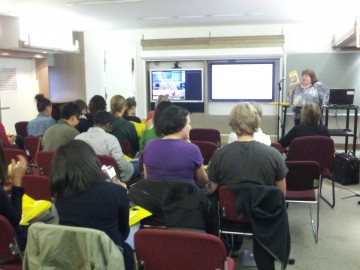Note: this project is no longer active and therefore is not recruiting new team members.
Where: The Inner City Community in Vancouver,Canada
When: 2013-2014 School Year
How Many People Per Team: 10
Faculty Supervisor: Dr. Barbara Fitzgerald
2013 Team Leaders & Contact Info:
Natasha Simula nsimula@alumni.ubc.ca
Maya Tong c.maya.tong@alumni.ubc.ca
Stefanie Elliott stefanie.s.elliott@alumni.ubc.ca
Ann Lin annhlin@alumni.ubc.ca
The GHI Inner City Community Project recognizes that global health includes local communities that are underserved. Ten minutes from where we sit in lectures there are children going to school hungry, whose basic needs are not met. Access to health care is a universal right in Canada, but there can be huge barriers to accessing services when health services aren’t available in your community or if you feel judged because of your background, poverty or multiple other challenges. Helping children with key social determinants of health including access to primary and specialty health services, access to recreation, food security, housing and safe and nurturing families are the cornerstone of the goals of the GHI Inner City Community Project. We recognize that helping children succeed in school works best from a holistic approach where all aspects of the child’s life are considered in their health care.
Members of the GHI Inner City Community Project work in inner city schools to help determine what the needs of the child are. We work with the families, teachers, social workers, counselors, primary health care providers and others to explore the needs, assess the child from a health and developmental perspective and then work with school, health and community resources to improve the child’s situation. Any family that has a child with specific learning needs would struggle to find resources and care for that child; for families that are struggling to fulfill their basic needs, this challenge can be overwhelming. The GHI Inner City Community Project strives to help families give their children the care they need to fulfill their potential.
Each medical student is assigned 1-2 families from Vancouver Inner City schools. The Developmental Pediatrician starts by making a full developmental assessment of the child that is referred from his or her family’s General Practitioner. Students may observe the full assessment and add to the information in the developmental assessment by making a series of visits to the child’s school to obtain a history (from parents and school professionals) and observe the child in the classroom and recess settings. The information is collected and then discussed with a Developmental Pediatrician. Based on this preliminary assessment, the medical student helps the school and family arrange for any provisional testing (i.e. vision and hearing assessments). The medical student supports the family by helping them access appropriate resources and by providing consistent follow-up. It is hoped that the student and the family will develop a relationship in which the student can act as a mentor to families, and help them navigate resources to improve the health of their child. In addition, the student would liaise with school professionals regarding the recommendations made by the Developmental Pediatrician.
This project takes place during the school year on a part time basis. Five training sessions are provided at the beginning of the school year, two of which are open to other 1st and 2nd year students with an interest in developmental pediatrics. Students will learn: how to
do a focused developmental observation, how to take a developmental history and read a school file, the basics of developmental milestones and developmental disorders, how to keep children safe and when to report abuse as well as how to work with marginalized populations.
In addition to the direct work with the children and families, some students may choose to start projects that are of special interest to them. Last year, some students worked on a food buying cooperative so that families have access to good, affordable, fresh food. Students are working on setting up health workshops for families and the children on topics that they are interested in. There is a lot of scope for students to get involved in projects that they are passionate about.
Research Component: Some students just want to work with kids and families and that is the main thrust of this project. But for projects to be sustainable and continue to receive funding, it is helpful to show through evaluation studies that the project is fulfilling its goals and making a difference. This year we will be surveying teachers, parents and the pediatrician on how student involvement adds to the child’s assessment and well-being. We will also evaluate how much each student learns about child development in the course of this project, with a pre- and post-test taken before training starts and at the end of the school year. We hope to show that student involvement makes for a more complete and global assessment of the child and that parents are find student input important and helpful. We also hope that students will learn the most important developmental milestones in typical development, features of atypical development and how to approach different developmental disorders from a health care perspective.
Recruitment for the 2014-2015 year: this project is now done as part of a self-directed DPAS project and has the potential of being a part of students’ flex time in the new UBC curriculum. Recruitment for next year’s group of students will happen in the Spring of 2014.
Specific Project Goals:
The medical students participating in the GHI Inner City Community Project will:
- Gain experience working with children who attend inner city schools in Vancouver
- Learn to make observations with respect to child behaviour and recognize typical child development
- Appreciate the multiple barriers faced by children living in poverty and the associated health implications
- Work with a team of health care and community professionals and understand their role
- Provide continuity in care for the child by liaising with health care professionals and community members
- Provide recommendations by professionals for children with behaviour and/or developmental disorders more quickly and efficiently
- Provide support and help identifying resources needed by the family


